|
|
|
Sort Order |
|
|
|
Items / Page
|
|
|
|
|
|
|
| Srl | Item |
| 1 |
ID:
180209
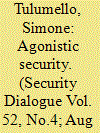

|
|
|
|
|
| Summary/Abstract |
This article aims to contribute toward transcending the dichotomy between deconstruction and reconstruction in critical security studies. In the first part, I review dominant (Western/liberal) logics of security and the main strands of critical security studies to argue that there is a need to overcome the liberal framework of the balance between rights and freedom, with its inherent imbrication with the fantasy of absolute security; and, contra the ultimate conclusions of deconstructive critique, at the same time to take the desire for security seriously. By advocating in favor of embracing the tensions that surface at the intersection of these two conclusions, I then move to my reconstructive endeavor. I set out a meta-theory – that of agonistic security – that is both analytical and normative in nature and inspired by the political theory developed by Mouffe and Laclau. Building on the opposition between antagonism and agonism, I argue that security belongs to the ‘political’ and that it constitutes a field of struggle for politicization. I then argue for three conceptual shifts that concretely define agonistic security: (i) from an absolute/static to a relational/dynamic understanding of security; (ii) from universalism to pluralism at a world scale; and (iii) from the dominance of individual rights in Western/liberal thinking toward an understanding of security as a collective endeavor. In conclusion, I take a step back and discuss the implications of agonistic security for the role of critique in security studies.
|
|
|
|
|
|
|
|
|
|
|
|
|
|
|
|
| 2 |
ID:
182451
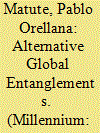

|
|
|
|
|
| Summary/Abstract |
While the call for broader conceptions about the political in general, and International Relations in particular, points to the need to redirect attention to the entanglements of societies, species and environments, in this article I address the way in which this proposed shift might still be reproducing anthropocentric understandings of global politics if serious attention is not devoted to the ontological foundations of the discipline. To do so, I first engage in a problematisation of decolonial efforts drawn from the Latin American experience that stress knowledge diversification as a means to emancipation. I then attempt to demonstrate that an exclusive intellectual engagement with entanglements and detachments might also be misleading, for their conventional conception is dependent on certain ontological commitments inherent to knowledge production, namely mind-world dualism and the linear conception of time. I therefore propose the notion of ‘detachment from knowledge’ as an alternative ontological practice through which IR students can themselves grapple with the dualist and anthropocentric oppressor/victim logic at the root of any emancipatory project. Such practice, I finally argue, not only allows us to understand the ‘global’ as indivisible, but also to engage with it beyond the exclusive pursuit of emancipation through knowledge, however diverse or decolonial it might be.
|
|
|
|
|
|
|
|
|
|
|
|
|
|
|
|
| 3 |
ID:
117771
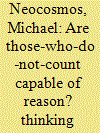

|
|
|
|
|
| Publication |
2012.
|
| Summary/Abstract |
This article is concerned to show that the historical science of the (neo-)colonial world is unable to allow for an analysis of the political subjectivities of 'those-who-do-not-count' or 'subalterns' as rational beings. Rather, it can only think such subjectivities as the products of people who are merely bearers of their social location, not thinking subjects. As a result, such history can only be a history of place, not a history of the transcending of place; it therefore amounts to colonial or state history. Historical objectivity invariably produces state history. The thought of the possibility of emancipatory politics, which always exceeds place, is thus precluded. This is an unavoidable epistemic problem in history and the social sciences in their current form. Following the work of Lazarus, I argue for an alternative historical methodology in Africa in terms of an internal analysis of the idioms of politics as discontinuous subjective sequences.
|
|
|
|
|
|
|
|
|
|
|
|
|
|
|
|
| 4 |
ID:
139239
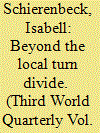

|
|
|
|
|
| Summary/Abstract |
This article builds on the contributions to this special issue by examining different approaches to the local turn and what can be learnt from applying them. The contributors agree on the imperative of understanding ‘the local’ in peacebuilding; however, there seems to be a multitude of ways forward in this regard. The immediate concern is how this acknowledgement translates into practices that allow for both efficiency and local emancipation in the building of peace. The article suggests giving up the ‘one-size-fits-all’ model of peacebuilding and engaging in context-based methods and research designs beyond generalisations. One way to go about this is to strive for interdisciplinary research – combining peace studies and political science with social anthropologists and area studies – but also to involve ‘the locals’ themselves in the process of taking a few methodological steps further.
|
|
|
|
|
|
|
|
|
|
|
|
|
|
|
|
| 5 |
ID:
172110
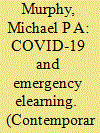

|
|
|
|
|
| Summary/Abstract |
The COVID-19 pandemic quickly led to the closure of universities and colleges around the world, in hopes that public health officials’ advice of social distancing could help to flatten the infection curve and reduce total fatalities from the disease. Drawing on Copenhagen school securitization theory and analyzing 25 declarations of emergency eLearning at American universities, I argue that in addition to COVID-19 being framed as a general threat, face-to-face schooling was also presented as a threat through these policies. A review of securitization theory—with particular attention to the question of advocacy and the relationship of desecuritization to emancipation—grounds the investigation theoretically. I argue that securitization theory is an important tool for educators not only for observing (and understanding) the phenomenon of emergency eLearning, but also for advocating the desecuritization of schooling after the COVID-19 crisis passes.
|
|
|
|
|
|
|
|
|
|
|
|
|
|
|
|
| 6 |
ID:
170369
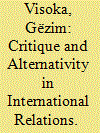

|
|
|
|
|
| Summary/Abstract |
This article critically interrogates the episteme of alternativity in international relations (IR) to rethink the purpose of critical knowledge in global politics. It questions what critical knowledge is for and whose purpose it serves. While alternativity is the very condition that has given rise to critical approaches, there is a deep-rooted division among critical scholars regarding the relationship between criticality and alternativity. This article argues that alternativity provides an opportunity for critical scholars to remain relevant without being affiliated with positivist logics of inquiry. In examining the potential of alternativity, the article explores three modes of alternativity in peace and conflict studies: critique-without-alternative, critique-as-alternative, and critique-with-alternative. It probes the merits and limits of the episteme of alternativity in generating new possibilities for advancing emancipatory interests and saving critical theory from losing its original transformative impetus. In the final part, the article explores future directions for rejuvenating the purpose of critique by exploring the nexus between criticality and alternativity on postparadigmatic and practical grounds.
|
|
|
|
|
|
|
|
|
|
|
|
|
|
|
|
| 7 |
ID:
073755


|
|
|
|
|
| Publication |
2006.
|
| Summary/Abstract |
Much of the appeal of deliberative democracy lies in its emancipatory promise to give otherwise disadvantaged groups a voice, and to grant them influence through reasoned argument. However, the precise mechanisms for delivery of this promise remain obscure. After reviewing Habermas's formulation of deliberation, the article draws on recent theories of argumentation to provide a more detailed account of such mechanisms. The article identifies the key emancipatory mechanism as explicitness in language. It outlines the primary modalities of this mechanism: expressing differences of opinion, mobilising a shared standard of inference, and recognising and excluding fallacious appeals to irrelevant factors such as force or authority. It describes how these modalities are enhanced at a secondary, reflexive level that recognises the partiality and defeasibility of particular argumentative exchanges. Such qualifications, it is argued, support a model of deliberation across discourses that allows a clearer appreciation of its potential and limits.
|
|
|
|
|
|
|
|
|
|
|
|
|
|
|
|
| 8 |
ID:
126706
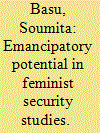

|
|
|
|
|
| Publication |
2013.
|
| Summary/Abstract |
Forum: The State of Feminist Security Studies: Continuing the Conversation. This forum comprises seven pieces conceived in response to the recent Politics & Gender Critical Perspectives section that featured contributions from Carol Cohn, Valerie Hudson, Jennifer Lobasz, Laura Sjoberg, Ann Tickner, Annick Wibben, and Lauren Wilcox (P&G 2011, Vol. 7, Issue 4). Throughout, we refer to this collection as "the CP section."
|
|
|
|
|
|
|
|
|
|
|
|
|
|
|
|
| 9 |
ID:
120086
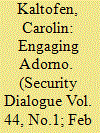

|
|
|
|
|
| Publication |
2013.
|
| Summary/Abstract |
Even though its focus on emancipation purposefully intends to build upon the intellectual legacy of the Frankfurt School, critical security studies has thus far only interpreted the Frankfurt tradition in a circumscribed manner. That is to say, it selectively drew on some concepts from critical theory that are most associated with Jürgen Habermas and Axel Honneth. However, as a result of this emphasis, Booth and Wyn Jones - the original proponents of critical security studies - give too little attention to thinkers such as Theodor W. Adorno. This article demonstrates that a re-engagement with Adorno's work not only provides a more complete appraisal of the Frankfurt School's thought, but also might reinvigorate critical security studies as a 'critical' approach to security. It proposes that such a result can be achieved by employing Adorno's ethics of resistance and through the development of the philosophical construct of a constellation of security.
|
|
|
|
|
|
|
|
|
|
|
|
|
|
|
|
| 10 |
ID:
129846
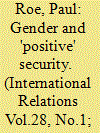

|
|
|
|
|
| Publication |
2014.
|
| Summary/Abstract |
Focusing predominantly on the works of Ken Booth and Bill McSweeney, this article explores how the normative commitment of the two writers to the individual referent and to a set of values constitutive of human agency is reflective of a more 'positive' security. In particular, the article focuses on how in their formulation of values, both Booth (security as emancipation) and McSweeney (ontological security) draw on gender and feminist approaches and, importantly, how critical feminist scholarship can profitably be used to reconcile concentration on both the global and the local, thus providing greater conceptual clarity and empirical grounding to the positive security project.
|
|
|
|
|
|
|
|
|
|
|
|
|
|
|
|
| 11 |
ID:
113818
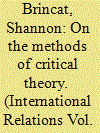

|
|
|
|
|
| Publication |
2012.
|
| Summary/Abstract |
This article offers a reconstruction of the methodological tools pioneered by the first generation of the Frankfurt School (FS) and how they have been adapted in the contemporary project of emancipation in Critical International Relations Theory (CIRT). It is argued that the praxeological and methodological commitments of the early FS are of continuing utility in the post-positivist turn in IR theory. The paper also argues that CIRT has made significant advances on the original programme of CT developed by Horkheimer in the early 1930s. In particular, it is contended that the alleged pessimism typically associated with the later work of the early FS can be overcome if critical analysis looks beyond the state to those possibilities of emancipation pregnant within the global processes of world politics. Here the work of CIRT is argued to offer a number of advances on the sociology of the early FS, which was problematically confined to the examination of Euro- and state-centric possibilities for emancipation.
|
|
|
|
|
|
|
|
|
|
|
|
|
|
|
|
| 12 |
ID:
084543
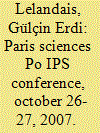

|
|
|
|
|
| Publication |
2008.
|
| Summary/Abstract |
The joint IPS conference that took place last October 26-27, 2007 at CERI-Sciences Po (Paris) was organized in the broader scope of the launching of International Political Sociology (IPS) in Europe. The conference also aimed at launching an innovative research dynamic among international researchers who are members of the International Political Sociology editorial board and members of the COST network. It was the occasion to discuss the theoretical and empirical innovation in the field of international relations IPS would like to encourage as well as the editorial orientations the journal may take, and cross visions.
|
|
|
|
|
|
|
|
|
|
|
|
|
|
|
|
| 13 |
ID:
179322
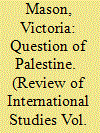

|
|
|
|
|
| Summary/Abstract |
While the gravity of the injustice and inequality experienced by Palestinians is now widely documented, evidenced, and acknowledged, when it comes to action the situation appears ‘impervious’ to international law and norms of global politics, with Israel largely enjoying impunity. This article argues that this state of affairs can be most coherently understood through a critical interdisciplinary emancipatory framework centred on ‘liminality’. Referring to situations and actors ‘betwixt and between’, the framework of liminality offers significant potential for understanding how particular actors and spaces are intentionally marginalised, disempowered, and silenced within global politics and international law. Furthermore, in revealing the root causes of liminality, and the inherent vulnerability of such spaces to contestation and subversion, the framework also opens up potential pathways of transformative emancipation. Applying the lens of liminality to Palestine, it is demonstrated that Palestinians have been deliberately corralled to a liminal space within international law and global politics in order to enable an expansionist Zionist/Israeli settler colonial enterprise. After exploring how Palestinian liminality manifests in global politics and international law, the article turns to a range of efforts to subvert Palestinian liminality and assesses prospects for a teleological emancipation for Palestinians.
|
|
|
|
|
|
|
|
|
|
|
|
|
|
|
|
| 14 |
ID:
139415
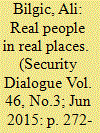

|
|
|
|
|
| Summary/Abstract |
The objective of emancipatory security theory is to examine the insecurities of individuals and social groups that stem from oppressive power processes, relations, and structures. However, the image of power in emancipatory security studies does not correspond to such a normative and analytical motivation. This renders the theory susceptible to substantial criticism on the grounds of inadequate analysis of resisting individuals as agents of security in their own localities. To address this issue, the present article conceptualizes ‘emancipatory power’. In this exercise, Hannah Arendt’s understanding of power, enriched by Judith Butler’s concept of performativity and feminist insights, will be used as the theoretical foundation to tailor collective power based on trust in a ‘moment’ of emancipation. Collective power will be illustrated by references to the protests in Cairo’s Tahrir Square in 2011.
|
|
|
|
|
|
|
|
|
|
|
|
|
|
|
|
| 15 |
ID:
182444
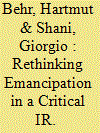

|
|
|
|
|
| Summary/Abstract |
This article seeks to reconceptualise emancipation in critically theorising International Relations (IR) by developing ‘thin’ and ‘thick’ versions of normativity and applying them as conditions for a pluriversal dialogue between different cosmologies. We start with the premise that ‘critical IR’ is both Eurocentric and a-normative, and argue that a normative engagement with critical discourses both inside and outside the West is necessary to recapture its emancipatory promise. Drawing on the work of Max Horkheimer, Herbert Marcuse and Jacques Derrida, we develop ‘thin’ and ‘thick’ versions of normativity. The former, we argue, operates as a critical corrective of thick normative positions, reclaiming their openness to difference, while not making substantive moral or political claims itself. We then apply these version of normativity to examine the possibility of a global pluriversal dialogue between different cosmologies. Cosmologies, we argue, refer to sets of ontological and epistemological claims about the human condition that are inherently normative. ‘Thin’ normativity applied to the ‘thick’ claims of cosmologies prevents the essentialisation and hierarchisation of cosmological difference(s) by revealing and de-constructing the latter’s potentially discriminatory, exclusionary, and violent tendencies. In so doing, it facilitates a global inter-cosmological dialogue which we regard as the objective of a post-western, critical IR.
|
|
|
|
|
|
|
|
|
|
|
|
|
|
|
|
| 16 |
ID:
174036


|
|
|
|
|
| Summary/Abstract |
This piece reconsiders histories of anti-racist thought and practice, including the linkages between anti-racisms and other traditions of liberatory thought. We argue that anti-racism should be understood as a strand in radical thought linking internationalism, institutional critique and street activism, in the process interfeeding with other social movements. The traditions of anti-racist thought discussed in this special issue exemplify these cross-cutting influences.
|
|
|
|
|
|
|
|
|
|
|
|
|
|
|
|
| 17 |
ID:
108671
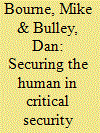

|
|
|
|
|
| Publication |
2011.
|
| Summary/Abstract |
This article argues that Critical Security Studies (CSS), exemplified by Ken Booth's Theory of World Security, has outlined an ethics of security as emancipation of the 'human', but also a highly problematic security of ethics. After drawing out how the ethics of CSS operates, we examine the security of this ethics by examining it against a hard case, that of the 1998-99 Kosovo crisis. Confronting this concrete situation, we draw out three possibilities for action used at the time to secure the human: 'humanitarian containment', military intervention and hospitality. Assessing each against Booth's requirements for ethical security action, we counter that, in fact, no option was without risks, pitfalls and ambiguities. Ultimately, if any action to promote the security and the emancipation of the human is possible, it must embrace and prioritise the fundamental insecurity of ethics, or else find itself paralysed through a fear of making situations worse.
|
|
|
|
|
|
|
|
|
|
|
|
|
|
|
|
| 18 |
ID:
105642
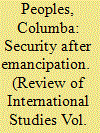

|
|
|
|
|
| Publication |
2011.
|
| Summary/Abstract |
Within the current configuration of Critical Security Studies (CSS) the concept of 'emancipation' is upheld as the keystone of a commitment to transformative change in world politics, but comparatively little is said on the status of violence and resistance within that commitment. As a means of highlighting this relative silence, this article examines the nature of the connection between CSS and the Critical Theory of the Frankfurt School. In particular it disinters the reflections of Herbert Marcuse on the connections between emancipatory change, violence and resistance as a means of interrogating and challenging the definition of 'security as emancipation'. Doing so, it is argued, points towards some of the potential limitations of equating security and emancipation, and provides a provocation of contemporary CSS from within its own cited intellectual and normative foundations.
|
|
|
|
|
|
|
|
|
|
|
|
|
|
|
|
| 19 |
ID:
092882
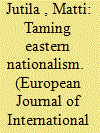

|
|
|
|
|
| Publication |
2009.
|
| Summary/Abstract |
This article uses the logic of explanatory emancipation to criticize post-Cold War minority politics. The main argument is that the ideational background of the double standards of minority protection originates from a contested dichotomy of nationalism that divides nationalisms into Eastern ethnic/malignant nationalism and Western civic/benign nationalism. After presenting the theoretical tradition of the 'Kohn dichotomy', the article traces its use in post-Cold War academic and official policy papers. Through intertextual analysis, this article shows how the old theoretical tradition was recycled into a new context to dispel post-Cold War confusion. This article presents a Critical Realist view on how ideas and theories can be treated as parts of the causal analysis of social practices. With explicitly causal language, identifying possible forms for emancipatory action is easier than with constitutive analyses.
|
|
|
|
|
|
|
|
|
|
|
|
|
|
|
|
| 20 |
ID:
173402
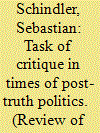

|
|
|
|
|
| Summary/Abstract |
Post-truth politics poses a specific problem for critical theories. The problem is that the relativisation of facts – the claim that knowledge is merely a product of power, history, and perspective – is a core aspect of present-day ideological thinking. Critical theories have been unable to respond to this challenge, because their critique has been directed against the opposite claim, namely the naturalisation of facts. While acknowledging this problem, this article argues that post-truth discourse actually combines relativisation and naturalisation. It does not simply relativise truth, but also naturalises the belief in specific ‘facts’ – notably the belief that ‘conspiracies are behind it all’. Once we recognise the twin character of post-truth, we must reject the view of Bruno Latour and others who have made critique responsible for the crisis. Instead, it then becomes apparent that there are deep and disconcerting similarities between post-truth politics and the totalitarian and authoritarian ideologies of the twentieth century. The task of critique is to confront and counter this resurgent ideology, thereby providing direction and orientation in the struggle for emancipation.
|
|
|
|
|
|
|
|
|
|
|
|
|
|
|
|
|
|
|
|
|